We saw him score goals, we saw him gloat with passion. He cried, he laughed. He fought, he was right or wrong. He forged his legend, day after day, week after week, month after month, year after year. He is Samuel Eto’o Fils.
Born on 10 March 1981 in Nkon, a suburb of Yaoundé in Cameroon, Samuel Eto’o, like most African children, learned to play football in the streets. He took his first steps in Mvog-Ada, one of the poorest neighbourhoods in Yaoundé, the country’s capital.
The son of accountant David Eto’o and Christine Eto’o, Samuel, like his five siblings (Sidonie, Madeleine, Pauline, David and Etienne), was enrolled at school. But the boy was much more interested in playing football.

When Samuel’s father lost his job as an accountant in Yaoundé, he took his family back to Douala and settled in New Belle, a sensitive district of the port city, after a few years’ exile. Poverty was threatening the family and panic was setting in, but little Samuel found shelter only in street football.
A fan of Roger Milla, Eto’o was already making a name for himself at the age of 9. Despite pressure and orders from his mother Christine to persuade him to go to school, the youngster complied but would not deprive himself of his hobby for anything in the world.
He absolutely wanted to kick a ball all the time and everywhere. In front of his house in New Belle, in a pile of metal sheets next to the religious centre, he insists on asserting himself as the strongest in the neighbourhood. Today, those first arabesques are immortalised in chalk on the wall of a hardware store: “Avenue Samuel Eto’o fils”.
It was here that he learned to dribble, among the chickens and cats, on uneven clay, against barefoot opponents. The little genius also spoke little. Samuel Eto’o was a very quiet, gentle and shy child.
When he scored a goal in the neighbourhood, he was given 1,000 CFA francs (about 1 euro 52 centimes) to buy a bottle of water or a kebab. Life was hard for the Eto’o family, but they managed to get by.
Samuel looked at him and said: “Are you Coach Diallo? You know, I’m very strong, I don’t know if you can teach me anything”.
Very conscious, he was talking to one of the most respected trainers in town. A kid had never spoken to him like that before. But Eto’o changed his mind a few hours later.
That evening, coach Diallo saw him arrive at the house near his own. He changed his mind and it was the start of a dream. He then joined the Union Camerounaise des Brasseries de Douala and crushed the competition. Before every match, little Samuel would read his prayers and put the piece of paper back in his sock. As the months went by, his talent blossomed on Douala’s less green and more open pitches. Cameroon had become too small for him. At the age of 15, he decided to conquer the European Eldorado.
Samuel Eto’o, between unsuccessful trials and European galleys
Leaving his native Cameroon, the then 15-year-old Samuel Eto’o landed not first in Europe but in Paraguay via Brazil. Businessman Pedro Aldave had in his hands the opportunity to take the young star to Cerro Porteño. In 1996, two young Cameroonians went on an adventure to Brazil: Gérémi Njitap and Samuel Eto’o.
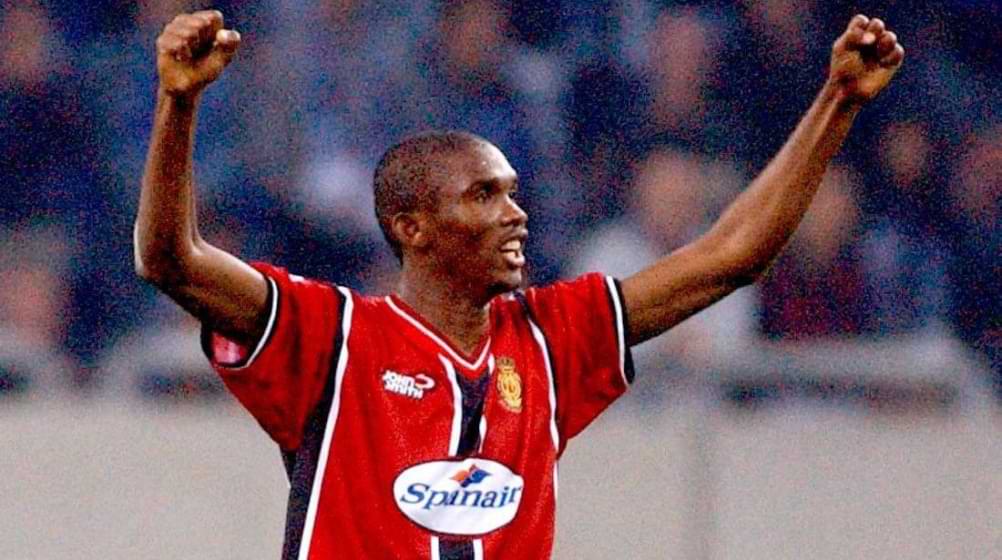
The two youngsters attracted the interest of Pedro Aldave, the President of Paraguayan club Cerro Porteño. The club ended up signing the young midfielder Gérémi and dropped Eto’o because of his physique. He was deemed too thin and without much of an edge to take on the violent defenders of Guarani football. The club didn’t want to take too many risks, so only one would travel to Asunción for the tests. Njitap signed for the Paraguayan club in early 1997 and Eto’o flew to France to try and find himself a club.
When he arrived in France, he only had a ten-day visa, which was not enough to settle in Paris. Eto’o went into hiding and never left his flat. He asked to join PSG’s training centre, but without papers, the club’s response was negative.
“At first I made the wrong decision, like all young Africans who dream of going to Europe. I had no papers in Europe. I arrived with a 10-day visa. I went to Marseille, Avillon, and I decided to stay at Notre Dame. I stayed in Paris. Afterwards, I told my sister that I was going back to Cameroon. It was difficult, because I stayed for several months and only went out 2 or 3 times. It was a time when everyone was suspected of having no papers and when you were caught you were repatriated, it was really difficult.
Samuel Eto’o returned to Cameroon very disappointed and decided to join the Centre Kadji Sport Academy (KSA), based in Douala, Cameroon’s economic capital. Samuel was no longer having fun; he was taking everything seriously and impressing at KSA. Le Havre, in partnership with the centre, invited him to Normandy for a trial. Eto’o left for France enthusiastically, but once again it was with disappointment and sadness that he returned home empty-handed.
A disagreement, the trial at Le Havre was conclusive but at 16, Eto’o wanted a professional contract but the club only guaranteed him a trainee contract. Not too discouraged, he took advantage of the remaining time to try out for ASS Saint Etienne and AS Cannes before returning home.
Samuel Eto’o’s first club
Back in Cameroon, Eto’o was called up to the Cameroon youth team when he was just 15. He scored twice against Côte d’Ivoire and was spotted by Pirri, then a scout for Real Madrid. Pirri offered him a trial at the Meringue club. Eto’o arrived in Spain 10 days later with a valid visa.
He passed the test with flying colours and Real Madrid offered him a contract. It was the start of a glorious, if somewhat nightmarish, dream. In his first season, he played for Castilla, Real Madrid’s reserve team, because he was considered too young to play for the first team.
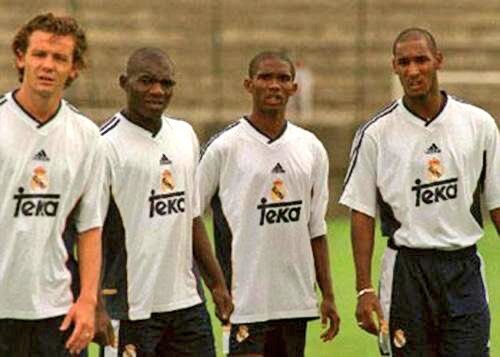
The competition was fierce and Real Madrid decided to loan their new star to CD Leganes for the 1997-1998 season. The club was playing in the 2nd division. Eto’o made his mark, scoring 4 goals in 30 games. At the end of the season, he returned to Real Madrid thinking he would eventually be integrated into the Meringue club. But the white club made him false promises and loaned him back to Espanyol for 6 months.
Samuel played no games for the club and returned to Madrid for a second time. He faced competition from Raul, Morientes and Nicolas Anelka. He still played 6 games but failed to find the back of the net. In January 2020, the club sent him out on loan again, this time to Mallorca with an option to buy.
“When I signed for Real Madrid, it was hope and the start of a dream for me. But my dream turned into a nightmare because I couldn’t do what I love to do most, which is play football. I got into a tussle with the President. Young players need to be given a chance. Nothing was easy for me. The day I said to my mum: today you won’t be selling fish any more, that was already a success for me.
And I said to myself, I’m going to make it, because for me it was painful to see my poor mum wake up at 2am to go and buy fish that she would have to sell the next day. If you don’t get that chance at a big club, you have to go somewhere else. Every time I played for Real Madrid in Mallorca, I gave it my all and had a chat with the Real Madrid president at the time.
He promised me: ‘No, Samuel, next season you’re coming back home and I was as happy as a lark. Next season, nothing at all”.
Real Madrid eventually sold Samuel Eto’o to Marjorque and the Cameroonian exploded into the red and black. At the time, Pedja Mijatovic, in charge of recruitment at the Madrid club, was keen to shed some light on Samuel’s situation. “We never thought about it. We never wanted Eto’o at Real Madrid. With Ruud van Nistelrooy, Arjen Robben, Raul… it would have been impossible to get him to play here. A terrible mistake, given the career accomplished by the Cameroonian legend. And Eto’o wrote his legend all by himself, as his career proves.
Samuel Eto’o’s club career
Samuel Eto’o scored 70 goals in 165 games for Mallorca, winning the Spanish Cup in 2003 but losing the Spanish Super Cup the same year. His fine form attracted the interest of Barça, the enemy of his former club, Real Madrid.
Barça had already managed to sign Ronaldinho a season earlier, but the Brazilian could not do the job alone. A key element was always missing up front. That piece was found one season after Roni’s arrival, in the Mediterranean on the island of Mallorca. Samuel Eto’o arrived and Barça rediscovered their sensations. The striker was the key figure in the club’s remarkable exploits.
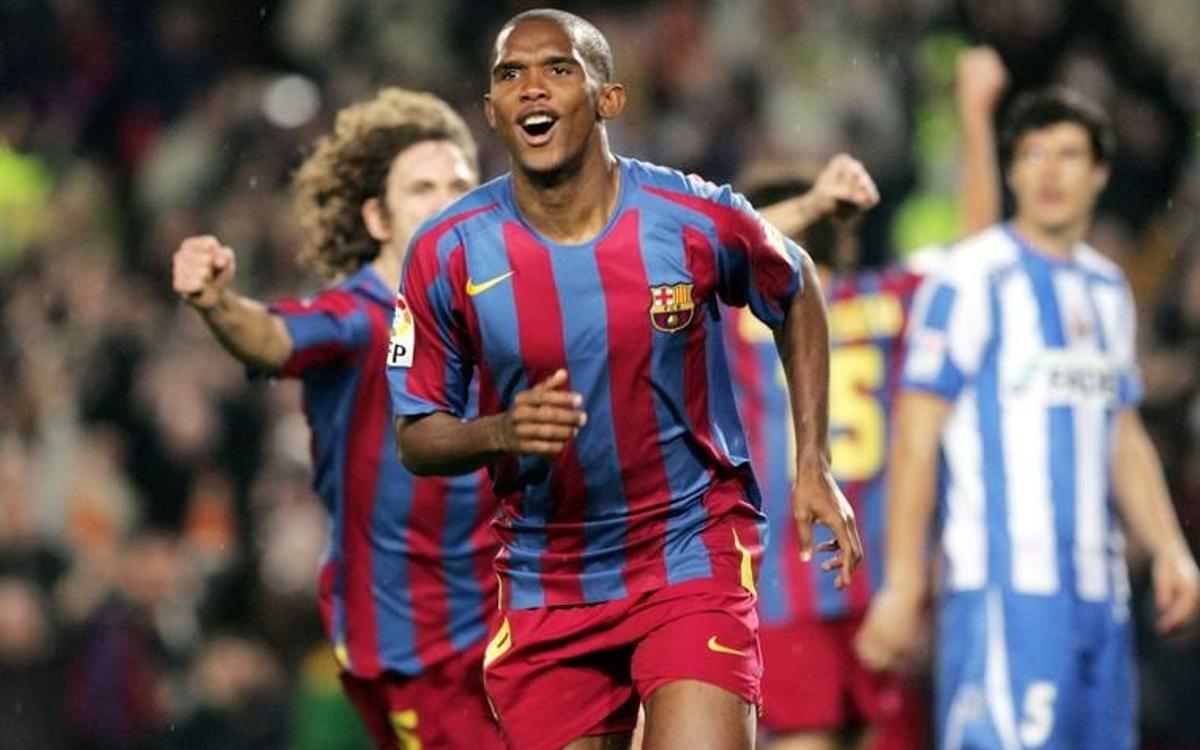
Eto’o’s press conference set the tone: “I ran like a black man to live like a white man. I’m not going back to Madrid, not even for 1,000 million”. He was a player on a mission, someone determined to prove his doubters wrong. He wanted to reach the absolute top at all costs, even if he had to drag a club that was still in disarray with him.
In his first season at the Camp Nou, Eto’o scored 25 league goals to finish top scorer in La Liga (the first time a Barcelona player had surpassed that mark since Ronaldo in 1997). He helped the Blaugrana to their first league title since 1999. In an emblematic moment during the celebrations at a packed Camp Nou, Eto’o took time to remember the doubters, leading the fans in an anti-Real Madrid chant.
But the arrival of Pep Guardiola hastened the Indomitable Lion’s departure somewhat. In his only season under Guardiola, he still finished as Pichichi, despite not getting on well with the Catalan coach.
“First of all, I went to see him to tell him that he wasn’t an excellent player, but a good one. I got an offer for a player. As a coach, he didn’t have the track record to impose his ideas on the Barça dressing room. I got an offer from Uzbekistan where they were paying me 26 million dollars for 6 months, and then Pep told me to go. I replied that it was Eto’o who would make you win, and you’d come and ask me to apologise. We were in the United States for pre-season training, and Guardiola told Thierry Henry to take the number 9 shirt, and me the number 14.
“It was a total lack of respect, because I’ve given so much to the club, and I couldn’t remain silent. At the end of the season, I scored 35 goals, and I scored the first goal in the Champions League final against Manchester United in 2009. That was followed by a drunken dinner at which Guardiola congratulated me on my season and my professionalism, and it was the first time I had put my trust in him. What I didn’t know was that it cost me my passport for Inter Milan.
At the end of that glorious season, in which Barça won everything, Eto’o was sold to Inter Milan for Zlatan Ibrahimovic. The Cameroonian brilliantly took up the challenge and went on to sign a second consecutive treble with two different clubs, becoming the only player on the planet to do so. “I’ll always be grateful to Guardiola, he enabled Inter to do the best deal, Ibra leaving for Barcelona for 80 million plus Eto’o, it’s the best transfer in the history of football”.
After winning 4 Champions Leagues (1 with Real Madrid, 2 with Barça and 1 with Inter Milan) Samuel Eto’o has never won the European Golden Ball. After two seasons in Italy, he moved to Russia and signed for Anji Makhatchkala. He became the best paid player in the world. But the sporting results did not follow.
After two seasons, he rejoined José Mourinho at Chelsea, and after one season, he began a series of adventures. First Everton, then a brief return to Italy with Sampdoria. Then it was on to Turkey. He spent 3 seasons at Antalyaspor and became the club’s all-time top scorer with 44 goals before falling out of favour with the fans following his decision to join Konyaspor. The Cameroonian ended his spell at Qatar SC and is forever a footballing legend.
-His national team debut
Samuel Eto’o made his debut for Cameroon’s youth team at the age of thirteen and fourteen, before being promoted to the juniors, with whom he scored a brace despite losing his first match against Côte d’Ivoire (3-2).
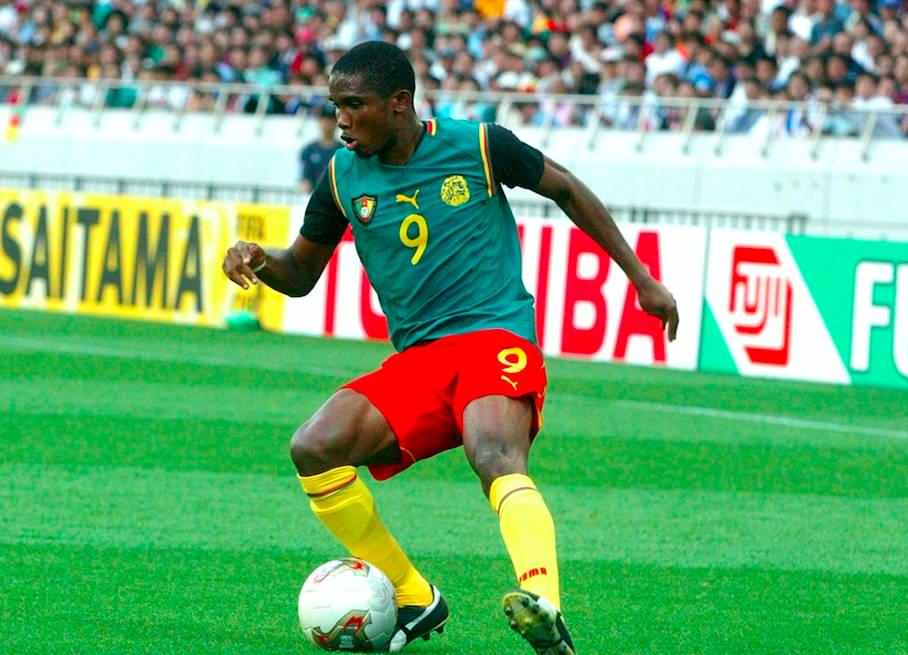
During his first season in Spain, with CD Leganés on loan from Real Madrid, Eto’o was called up to the Cameroon senior team by new coach Claude Le Roy. Samuel went on tour before being selected for the 1998 World Cup at the end of the season. At 17 years and 3 months, Eto’o was the youngest player at the tournament.
In attack, the team was dominated by Patrick Mboma and François Omam-Biyik. On the first day, Cameroon and Austria drew 1-1. On the second matchday against Italy, Eto’o came on in place of Mboma in the 66th minute, but was unable to prevent defeat (0-3). On the final matchday, Cameroon and Chile played out a 1-1 draw and were eliminated. Samuel’s debut wasn’t amazing, but he’s still young, very young, and has plenty of room for improvement.
It was 28 January 2000, time for the African Cup of Nations, and in the second match between Cameroon and Côte d’Ivoire, Eto’o scored his first international goal in the 45th minute (3-0).
The legend began to take shape, with Eto’o becoming the tournament’s second-highest scorer alongside his compatriot Patrick Mboma. The feats and titles would follow, and Eto’o would win them again and again.
-Achievements with the national team
Samuel Eto’o has a record as long as his arm. In the national jersey, the Indomitable Lion has won many collective and individual titles. In 2000, he was already named African Footballer of the Year. A hopeful who would go on to become the African player of the year in 2003, 2004, 2005 and 2010.
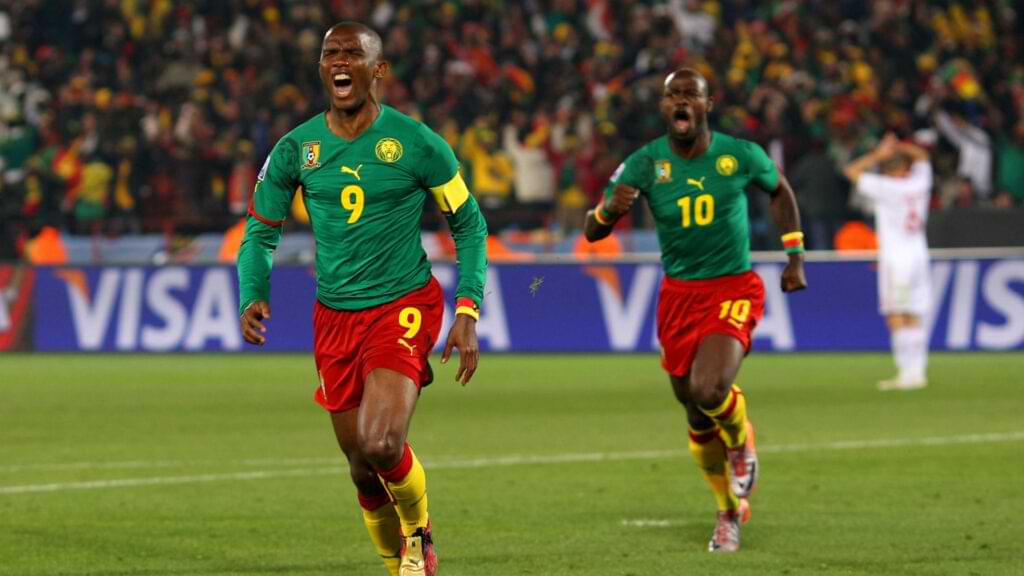
He also won a number of individual awards, including the African Golden Lion in 2004, 2009, 2010 and 2011. Samuel Eto’o also racked up a string of goals for Cameroon. He topped the continental scoring charts with the top scorer award at the African Cup of Nations in 2006 (5 goals) and 2008 (5 goals). It is impossible to talk about his exploits with Cameroon without mentioning the year 2006, when he was named in the best team of the Africa Cup of Nations.
To complete the circle, Samuel is Cameroon’s all-time top scorer with 56 goals. He is also the all-time top scorer at the African Cup of Nations, with 18 goals. Masterclass. Here is a man who has made Cameroon dream for nearly 15 years. A busy international career that has had its ups and downs.
-Its conflicts
And yes! You can’t talk about Samuel Eto’o without talking about a man with a strong character. The Cameroon legend is one of those hard-nosed players who can go toe-to-toe with anyone.
At club level, for example, he has had his run-ins with Pep Guardiola. The 2009 version of Barcelona, coached by Pep Guardiola, is surely one of the best teams football has ever seen.
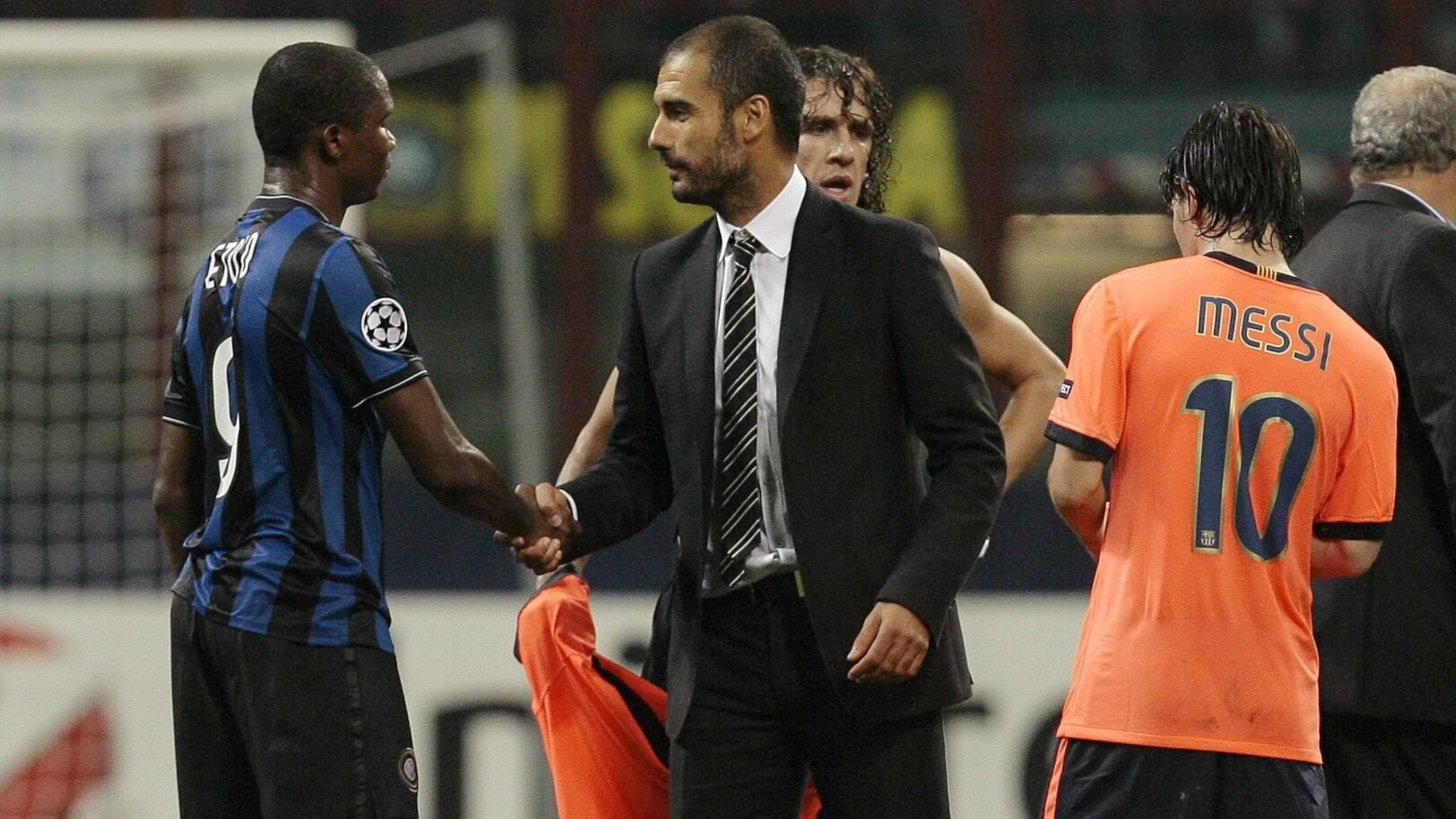
An essential part of this historic team, Samuel Eto’o has nevertheless had huge problems with Pep Guardiola. The Spanish coach did not always have faith in him, and at times did not hesitate to play down the Cameroonian legend. The latter responded both on and off the pitch.
And Samuel Eto’o has had his share of clashes. He clashed with Roger Milla, whom he accused of stabbing him in the back when the latter invited him to stop thinking of him as his father. And what can we say about the incredible affair with Alexander Song, with Song’s barely concealed accusations against Samuel Eto’o for wanting to get close to his wife?
In an audio recording that has been making the rounds on the internet, Alex Song said he was ready to do battle with Samuel Eto’o, who was not really interested in the affair, no doubt busy with other battles. And yes, Samuel Eto’o has had his share of fights.
In 2011, for example, he had a run-in with Dutchman Wesley Sneijder. It was nothing out of the ordinary, but it had the effect of ruining the atmosphere in an Inter Milan team that was due to face arch-rivals AC Milan in the Italian Supercup. Eto’o and Sneijder lost that match, leaving a bitter taste in the mouths of their team-mates, and it is fair to say that they got into a fight over first-class travel.
And Samuel Eto’o has not only had conflicts with the football world. Politicians and some Cameroonian citizens have not taken kindly to his rapprochement with Paul Biya. We remember that the former FC Barcelona striker made his supportive remarks at the end of the audience that the Cameroonian Head of State granted to the CAF delegation and to Samuel Eto’o.
The delegation was made up of President Ahmad Ahmad, his vice-president Constant Omari and Dieudonné Happi, the chairman of Cameroon’s football normalisation committee. Whatever his compatriots may think, Eto’o is a friend of Paul Biya. A friendship he fully embraces.
Samuel Eto’o’s latest clash was with Patrick Mboma. The two men got into a verbal brawl after Samuel Eto’o reproached the former Cameroon striker, who had applied for the position of Cameroon coach. From one post to another, the two men defended themselves on social networks, and since then things seem to have calmed down.
But nothing is ever calm when your name is Samuel Eto’o. The former Barcelona striker made an impression on us all when he celebrated, showing off his black skin, in the Champions League final against Manchester United. He has always fought against racism.
His actions (his foundation, his support)
The Cameroonian legend, who has played in a number of countries, has often been the victim of racism (particularly in Spain and Italy). This phenomenon continues to occur and for him, it is up to the football authorities to find solutions by taking strong decisions.
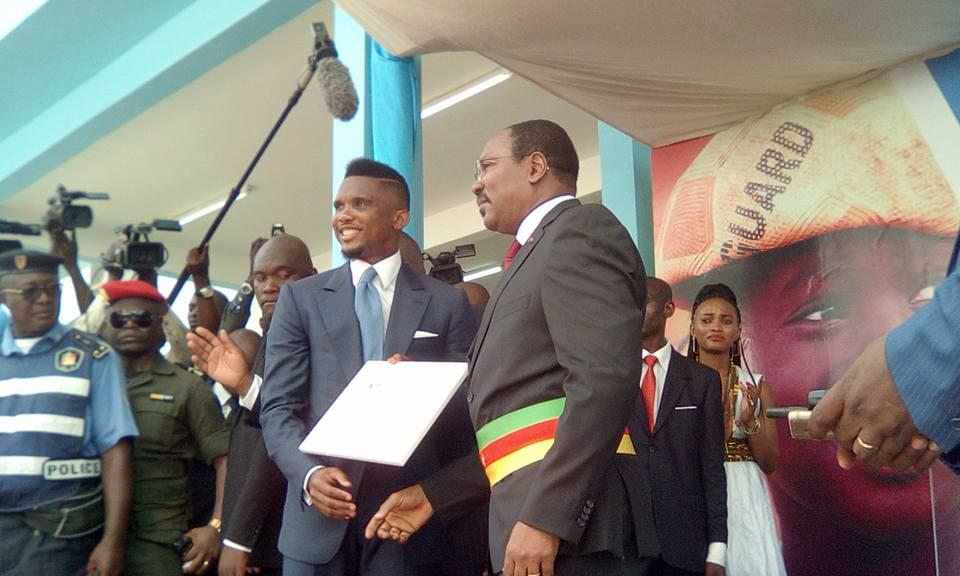
In his opinion, the world of football also has to deal with the thorny issue of racism. While parts of Italy still don’t consider monkey calls to black players to be racist, l is leading the fight. Faced with a wait-and-see attitude on the part of Serie A managers, the players are struggling to get organised, even though a few months ago Blaise Matuidi promised that if the situation were to reoccur he would simply walk off the pitch.
Samuel Eto’o is also advocating such a solution. Asked by La Gazzetta dello Sport to comment on the matter, the three-time Champions League winner did not beat about the bush: “Of course you have to leave the pitch. Football moves a lot of money, but most of the players who generate it are black. If one day, with the support of the white players, they decided not to play here, I think everything would change very quickly. It’s a radical decision, but one that could be rewarded. The recent case of Moussa Marega demonstrated the need to stop everything in the event of racist acts.
-Beyond his fight against racism, Samuel Eto’o is a legend with a good heart, and his good deeds are felt through his Foundation. Created in March 2006, the Foundation is a not-for-profit organisation whose activities are mainly concentrated in West Africa. The Foundation uses this factor with responsibility and commitment, and in so doing raises society’s awareness of the needs of a continent like Africa. Its aim is to protect children and young people, providing emergency aid and promoting education, health and social integration for the most disadvantaged, to help them build opportunities for the future.
The Samuel Eto’o Foundation also uses sport as a tool to help integrate mentally handicapped children.
Since 2008, the Samuel Eto’o Foundation has awarded 80 scholarships each year to the best students at the University of Yaoundé II. In 2010, the foundation also made a major effort with the delivery of computer equipment.
On the humanitarian front, the foundation has helped to set up five orphanages in Cameroon. In 2008, the Samuel Eto’o Foundation and USP Fundación Alex (based in Barcelona) reached an agreement to provide hospital assistance to children in Cameroon aged between 1 and 14 suffering from illnesses that are difficult to operate on in the country.
In addition to his Foundation, Samuel Eto’o is also at the head of the Fundesport project, four training centres based in Cameroon (Douala, Yaoundé, Limbé and Bamenda) and another in Gabon (Libreville). The aim is to offer the best possible opportunities to young African sportsmen and women, using football as a tool for social, economic and cultural development, while ensuring that these young people find secure employment.
Youngsters like Lionel Enguene, Jean-Marie Dongou and Gaël Etock, who have come through Fundesport, have gone on to join La Masia (FC Barcelona’s training centre). Fabrice Olinga, who became a Cameroon international at the age of 16, also came through Fundesport. A women’s handball section has been created through a partnership with BM Atlético de Madrid. Samuel Eto’o’s commitment to the underprivileged is unwavering, and his efforts are unstinting.
-Retirement
He retired from international football following his elimination from the 2014 World Cup. Suffering from a knee injury, he only took part in the first match against the Mexicans. He announced his retirement from club football on the night of Friday 6 to Saturday 7 September 2019.
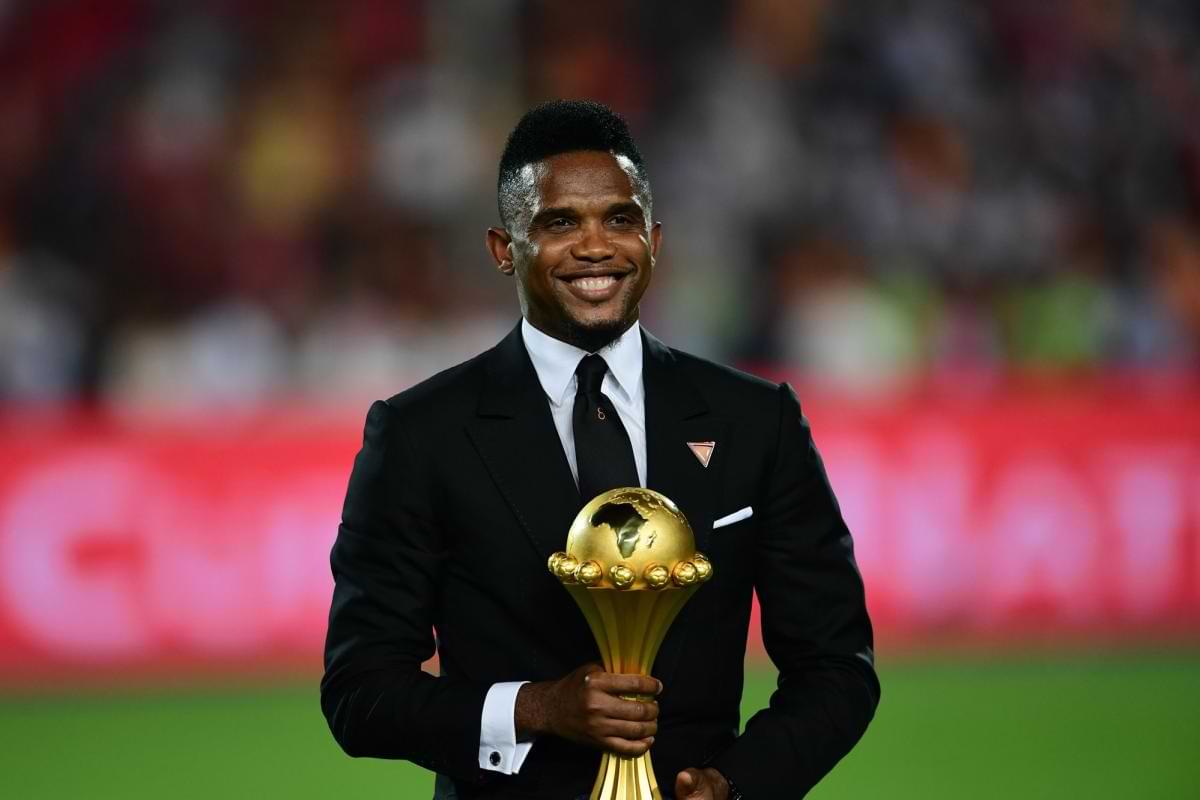
“I’ve been racing for 24 years and I think it’s time for me to enjoy myself with my wife and children”. But Samuel Eto’o, as always, promised in the aftermath that he would be back very soon. “I won in Europe as a player, I have to win in Europe as a coach,” he told Canal Plus.
Reconversion
Could we have imagined him far from football? Samuel Eto’o initially announced that he wanted to become a football coach, but in the meantime he has been working with Ahmad Ahmad. He is now at CAF, where he is in charge of relations with football federations and confederations. His role is to act as an intermediary between the President of CAF and the various federations on the African continent.
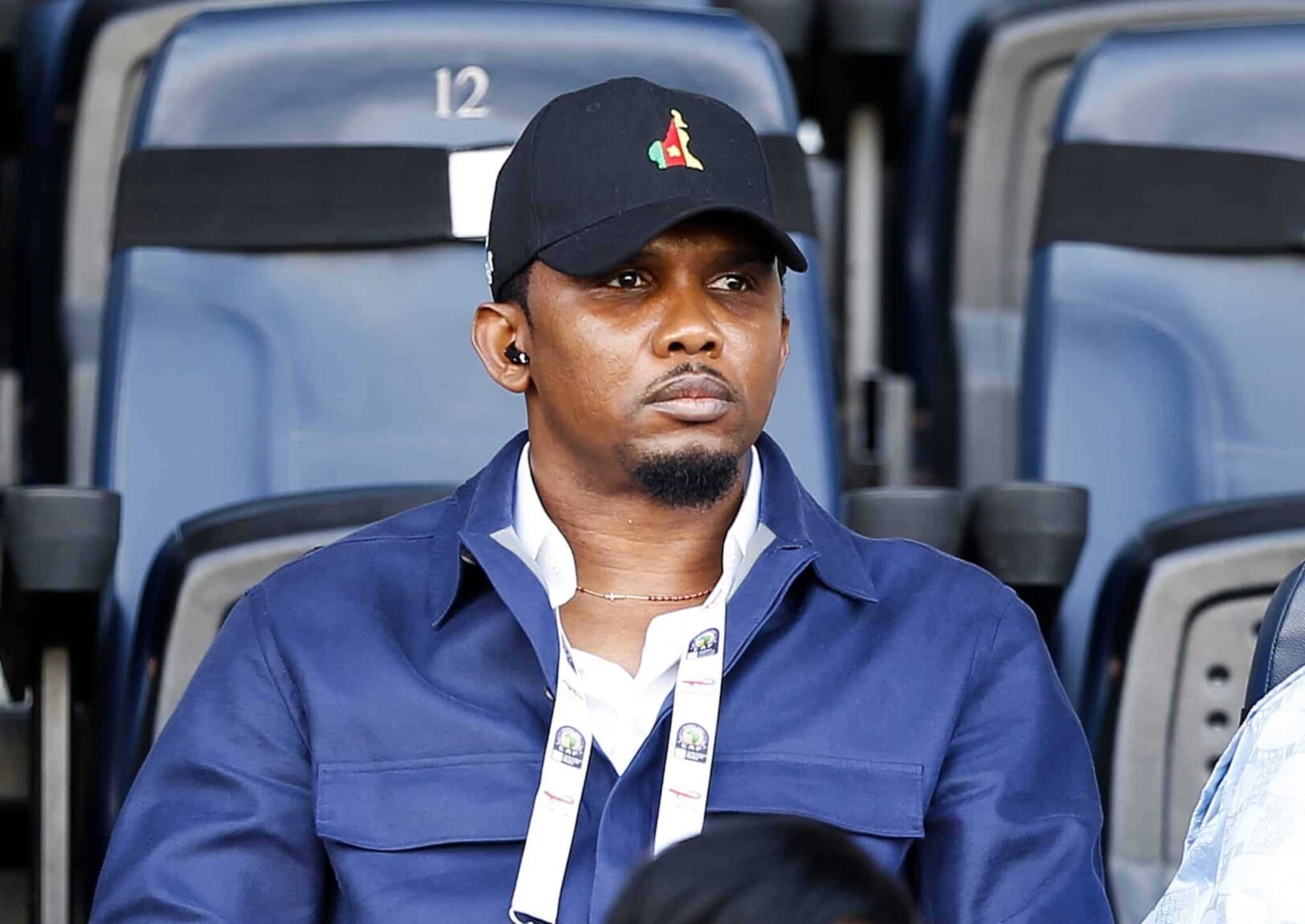
Quite a role for a young retiree. A young retiree who keeps his ambitions as a technician in mind. He already has his game plan. “I’m a fan of Guardiola. I love football and I tell myself that you have to win in the right way. Football is like going to the theatre: it’s nice to go to the stadium and see a great show. When you watch Guardiola’s teams play, you never get bored because you see a team defending with the ball, attacking, creating space… You see some magnificent action! So we can expect some tiki taka when Eto’o takes charge of his first team.
The challenge is immense, but the man is not small. A career filled with highs and lows, but a career that few players have been able to achieve. From the streets of Cameroon to European and continental glory, Samuel Eto’o is a legend, hated or adored, but a legend in the purest sense of the word. These few minutes will no doubt have made that abundantly clear.
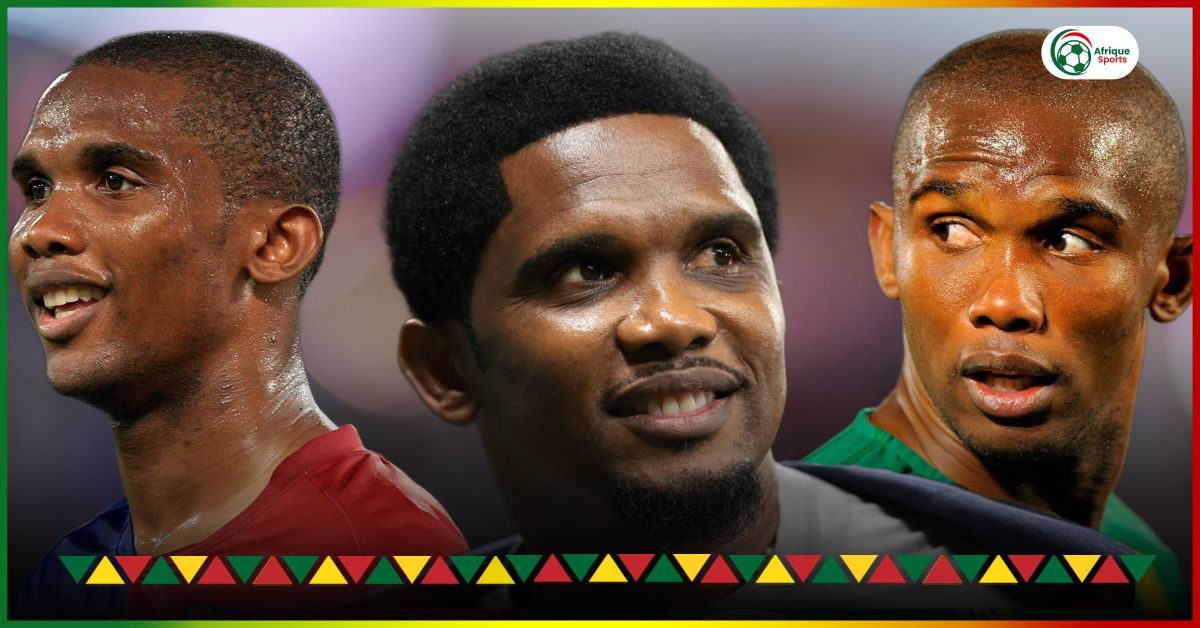
Leave a Reply